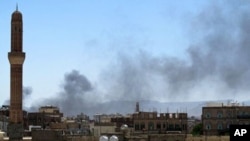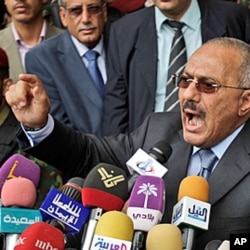Large explosions rocked Yemen's capital Sana'a on Wednesday as members of the nation's most powerful tribal federation kept up their fight to oust President Ali Abdullah Saleh. At least 41 people are reported killed and dozens of others wounded in the past day. As the situation worsens, some are looking beyond the current crisis to envision a post-Saleh Yemen.
Government and tribal fighters are battling for control of key ministry buildings in the capital, while the home of Hashid tribal chief Sheikh Sadeq al-Ahmar continued to come under attack.
Gunfire echoed across Sana'a as ambulances ferried the injured to hospitals. Some residents continue to leave the city to seek relative safety in outlying villages, while those remaining are stockpiling basic supplies, including food and gasoline.
Even in the chaos, political protesters continue their vigil in the capital, pressing their demand that President Saleh step down.
In the southwestern city Taiz, anti-government demonstrators are still reeling from a brutal crackdown that began Sunday and left dozens dead. Also in the southwest, militants are consolidating their hold on the city of Zinjibar. Reports indicate the fighters want to form an Islamic emirate in the region, but there are conflicting accounts of their exact aims beyond ousting President Saleh.
The focus on pushing Saleh from power is a possible unifying force among the various opposition groups. But Nasser Arrabiyee, a Yemeni writer and political analyst in Sana'a, says a larger vision is needed.
"Saudi Arabia and the United States are almost the key players in the Yemeni crisis in terms of thinking what is the next step after Saleh," said Arrabiyee. "The people, unfortunately, internally, the opposition here only think on how to remove Saleh, how to oust Saleh. This is the problem of the Yemeni opposition."
Saudi Arabia plays a key role in the Gulf Cooperation Council plan, backed by the United States, to see a transition away from Saleh to a more representative government. The president has rejected the plan three times, further infuriating opposition groups.
Yet the opposition's different ideologies as well as tactics - street battles in Sana'a, the militant takeover of Zinjibar, and peaceful protests in key cities - has meant there is no obvious alternative to Saleh.
Political analyst Arrabiyee believes that if there were, Saudi Arabia and the United States would try to replace the president "overnight."
"I do not mean there is no one who would replace Saleh," added Arrabiyee. "No. But Yemen was [nominally] democratic, but it was almost a totalitarian regime. So, it's difficult to find that one in a short time. But if they could pave the way for good elections, then this one will come and the good leadership will be there and the stability will be there."
With battles flaring up across the country, the idea of elections and stability seem remote. But some long-time observers of Yemen think those who have dealt with instability before may prove useful yet again.
A former U.S. military officer once stationed in Yemen points to General Mohamed Qasimi, who is among a group of high-ranking military defectors from the government, as an example.
The former U.S. officer, who preferred not to be identified, notes Qasimi played a key role in ending a civil war in the 1990s as well as suppressing - albeit temporarily - a rebellion in the north.
There are also a number of tribal leaders who could potentially lead a post-Saleh government. Not least among them are members of the Hashid federation, currently battling with Saleh's troops in the capital.





